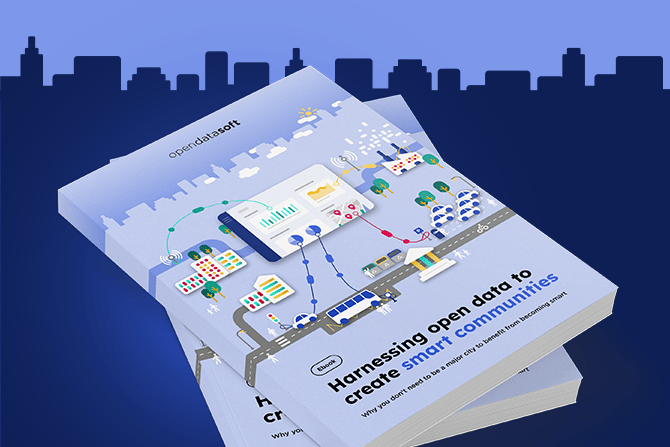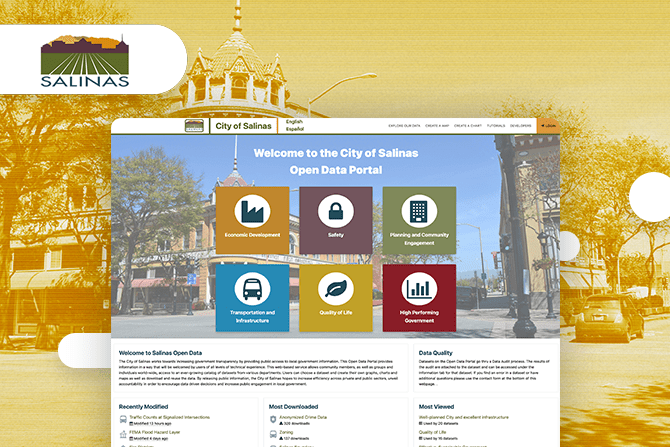How local government can build trust through transparent data sharing
Around the world, trust levels between government organizations and citizens are dropping. Rebuilding trust relies on greater transparency - we explore the importance of data sharing to the process and outline how municipalities can create effective open data portals to strengthen engagement with their stakeholders.

Trust is vital to building lasting relationships across every industry. However, it is particularly important when it comes to government. Citizens have to trust that elected officials and public institutions, from municipalities to central government departments, are acting fairly, openly, and in the best interests of their communities. That requires public officials to follow strict ethical standards and be open when it comes to their behavior and decision-making.
The growing government trust gap
Unfortunately, globally we are seeing a breakdown in trust between citizens and their governments, despite the rise of transparency initiatives such as Freedom of Information (FOI) Acts across the world. Just 50% of those surveyed in the 2023 Edelman Trust Barometer said they trusted the government in their countries, and only 39% saw government agencies as a source of trustworthy information.
Restoring trust is vital for the future of democracy and for meeting the challenges we face as a society. A lack of confidence in government leads to disengagement by citizens, increased suspicion and ultimately impacts willingness to pay taxes and obey rules created for the greater good.
How can public institutions rebuild trust?
To create trust essentially citizens need to be assured that public officials are acting ethically at all times, that decision-making is unbiased, and that institutions follow strong governance frameworks.
Data is central to providing the evidence required to demonstrate transparency, but it has to be:
- Openly and easily available to all, without requiring users to pay for access or have technical skills to view it
- Complete, comprehensive and unedited
- Understandable to non-specialists
Delivering this combination can be difficult. For example, unedited data might be open to being misinterpreted or not be accessible to those without the right skills, while making data understandable to non-specialists through visualizations could lead to accusations of editing information to suit a particular agenda. Finding and providing data from across a public organization in response to FOI requests can take time, forcing citizens to wait for answers, while adding to the workload of public employees.
The importance of open data portals
All of this makes public open data portals vital to providing transparency into the workings of government, enabling citizens to hold organizations to account. To be successful open data portals need to have these capabilities:
- Have a intuitive user interface that makes it easy for everyone to interact with data
- Be accessible from any internet-connected device from a PC to a smartphone
- Be easy to navigate and have powerful search functions that enable users to find the data they are looking for
- Provide a comprehensive range of high-quality, reliable datasets that are well-maintained and always current
- Combine access to raw datasets with compelling visualizations that bring data to life and provide context
- Enable users to interact with data themselves, such as to create their own visualizations or export data easily so that they can embed it in their own documents or apps
- Drive two-way communication, with users able to ask data owners about their datasets and provide feedback on the data that they’d like to see
The rise of the Transparency Hub
While open data portals have been in existence for many years, pioneering local authorities are taking them a step further, focusing on the specific need to create trust with their audiences.
A perfect example of this is the pioneering Transparency Hub created by Frankston City Council in Australia. Part of a larger policy to increase engagement, trust and sustainable development of management of assets and infrastructure, the Hub promotes good governance and encourages the ethical and legal behavior of councilors and local government employees.
A finalist in the 2023 LGPro Awards for Excellence, the Transparency Hub is a user-friendly portal that allows the community to easily access, understand, explore and visualize the council’s data. It brings together a broad range of data sources, providing an overview of Frankston City Council’s decision-making and activities. As well as providing data stories and visualizations, there are clear links to the raw data if users wish to access this.
Councilor data
Citizens need to have full confidence in their elected officials. To support this, the Transparency Hub contains information on Frankston’s councilors, including the expenses they have claimed, attendance at meetings and briefings and a summary of decisions they have taken. This demonstrates accountability and builds trust.
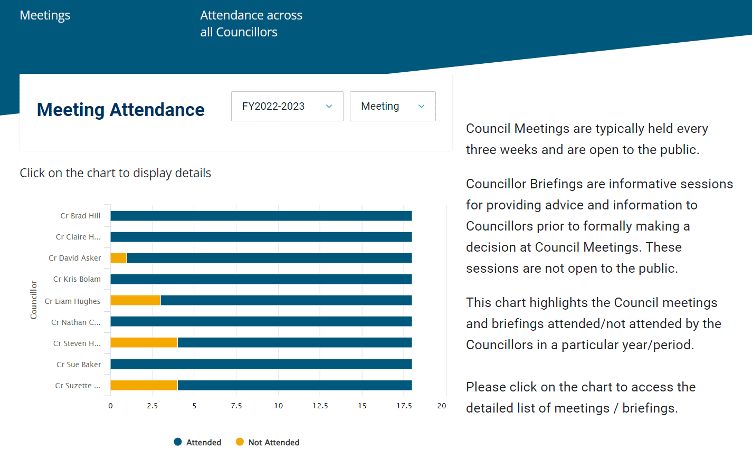
Council financials
The Transparency Hub contains extensive information on the council’s financials, including expenditure, income, procurement and progress on capital works projects. For example, there are full details on all contracts worth over AUS$200,000 that have been awarded, with an interactive dashboard enabling citizens to drill-down to the level of individual companies and search by date range. Explanatory text provides context to increase understanding and transparency.
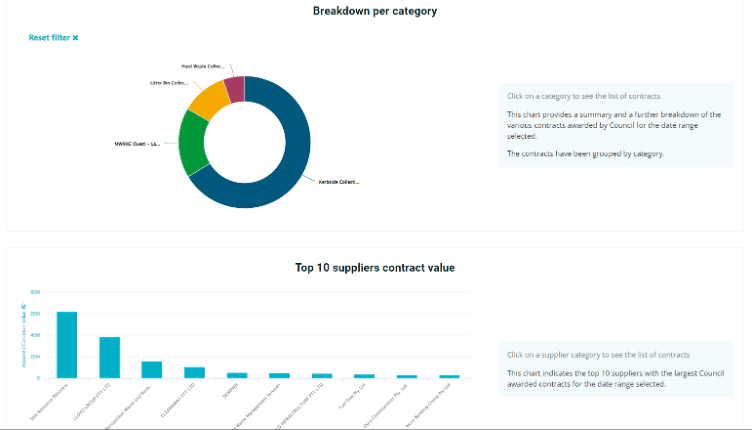
A separate dashboard provides information on grants awarded by the council to local not-for-profit initiatives, as well as applications made by Frankston to receive state and federal funding.
Animal dashboard
The council has responsibility for pet registrations across the city, and shares this data via an interactive data story. Users can see how many dogs and cats have been registered, their gender, the areas where they live and even the most popular names! Citizen requests related to animals (such as noise complaints) are also displayed via the dashboard.
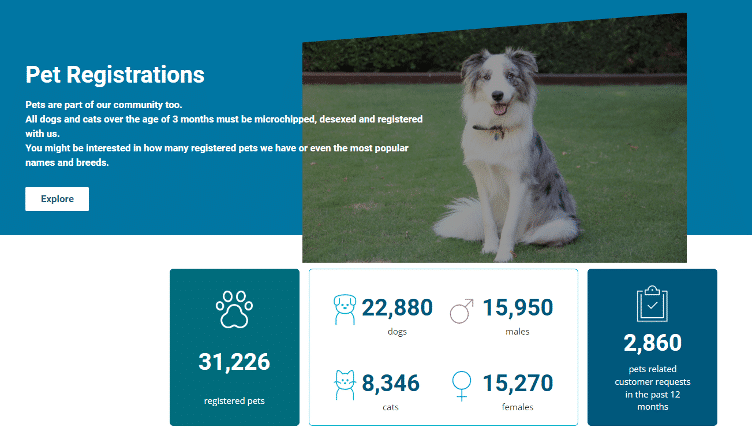
Smart city initiatives
As part of its commitment to enable sustainable transport and create a smart city, Frankston operates an e-bike scheme. The Transparency Hub provides full details on its usage, including average journey length, usage, sustainability benefits, and most popular times and routes. The aim is to show the benefits of the scheme and increase adoption.
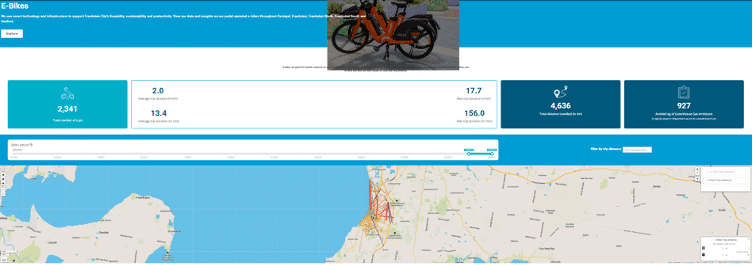
A focus on continual improvement
The Transparency Hub was first launched in 2022, and is being continually improved with new datasets and stories, driven by the needs of citizens. Current plans include publishing data on the expenses of key management personnel, GIS datasets and information on waste and recycling across the city.
Delivering transparency across municipal government
Around the world, municipalities and cities face challenges around operating effectively, efficiently and in the best interests of their communities. They need to demonstrate good governance, justify decision-making and show how they are performing against KPIs. All of this builds trust and engages citizens – open data portal initiatives such as Frankston’s Transparency Hub are therefore key to strengthening relationships and creating supportive communities.

